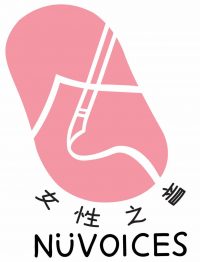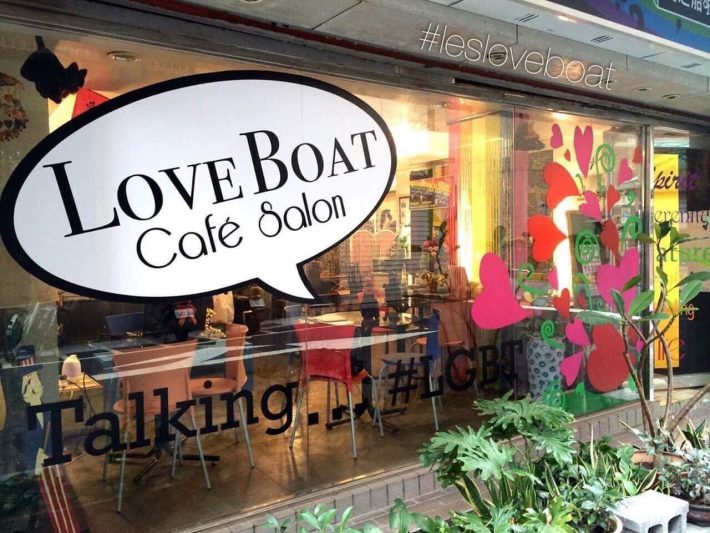BY WUJUN KE
When Kitty Lee asked me to take off my glasses and stretch out my hands, I wasn’t sure what to expect. Kitty is the manager of Love Boat, an eclectic sex toy and divination shop in Taipei, Taiwan targeting queer women, and we were about to do an I-Ching reading. For the next minute, I could only hear the banging sounds of a calligraphy brush striking against the black and gold astrological map on the table. When I opened my eyes and put on my glasses, the world came back into focus. Kitty seemed as if she had returned from a trance. “This person has a strong need for personal freedom,” she said. “She will travel the world and immerse herself in many different cultures. She can do whatever she sets her mind to, but her career must allow her to travel widely.”
I felt as if she could see into my soul. While the more skeptical among us might write off this display of psychic intuition as just an accurate cold reading (I did explain to her earlier that I was a Chinese-American studying Mandarin in Taiwan), I left interested in learning more about the art of fortune-telling and how queer individuals might benefit from this service.
The following week, Kitty and I chatted over tea in her well-lit store. Soothing piano music was playing in the shop, which was decorated by rainbows, black cats, Tibetan prayer flags, incense, colorful mandalas and beaded curtains that led to cozy consultation tables. The services offered here are motley. They include light healing, aromatherapy, knife massages and multiple methods of divination. Next to the entrance is a café space advertising a small selection of coffee and tea. In the back sits a rack of chest binders and a small cabinet of women’s sex toys. The diverse store also stocks books, rainbow ribbons, and hand-made trinkets, which – if worn on a backpack or jacket – would signify the bearer was supportive of queer rights and most likely queer women themselves.
Founded in 2004, Love Boat is one of the first stores in Asia to provide goods and services catered to lesbian women. Kitty started working at Love Boat at the age of 27 and has worked there for over a decade. She befriended the founder of the store, Vivi Lee, while taking classes on divination. A former high school teacher, Vivi had always loved collecting folk art, antiques, and handicrafts. In the beginning, she had a modest dream of opening a store that sold antiques and collectibles. The success of the store as a beacon for the lesbian community in Asia was entirely unanticipated.
“At the beginning we weren’t trying to fight for lesbian recognition or empowerment. All we wanted was to create a safe and comfortable space for our friends.” Kitty explained. “Subsequently, reporters used their own perspectives to write about what this store symbolized for them.”

The store soon captured the interest of local LGBTQ+ artists, who began to offer crafts for sale. As the proportion of LGBTQ+ merchandise grew, the shop’s stock of antiques concomitantly decreased. Besides browsing, customers also enjoyed chatting with Lee and telling her about their lives. Many of them would cry as they spilled their innermost struggles. While she offered a listening ear, she felt helpless for she was unable to provide any practical help. Soon after, Lee began taking classes on divination.
According to a 2004 survey from Academia Sinica, about a third of people in Taiwan have consulted with a fortune teller at least once in their lives and 56 per cent see it as helpful for providing peace of mind. While Love Boat provides a therapeutic service and a comfortable space for queer clients, Kitty was careful to say that Love Boat employees are not professional psychologists. Instead, they use symbolic aides such as Tarot cards as an indirect method of accessing the client’s personal lives. “But even if we were doctors, there’s no way to use science to cut open people’s brains and evaluate if they’re truly lesbian or not,” Lee added.
While her clients struggle with love, work, health and finding meaning or purpose like anyone else, they might also struggle with the question: Am I really a lesbian?
In Taiwanese society, some still think of same-sex attraction as a phase; perhaps a result of immaturity, confusion, or feelings of loneliness. Given the social pressure from family and spiritual leaders to be straight, Love Boat employees initially affirmed clients that they were lesbian on principle. But their methods changed with time.
“After identifying as lesbian for many years, you suddenly think, ‘oh my god, how could I like a man?’” Kitty recalled. “All these years at this store, I found out that this was indeed the case. People like to tell themselves, ‘I’m lesbian, I’m lesbian,’ but then they go travel or study and find a straight (male) classmate they like.”

To help her clients resolve the difficulties of transitioning from one kind of attraction to another, Kitty draws on the wisdom of Daoism, a school of thought founded by Chinese philosopher Laozi which emphasizes coming to terms with the ever-changing nature of life. Advising clients to be aware of gender fluidity rather than putting themselves into boxes, she cautions that unexpected changes are a part of life and that we can only choose whether the changes will be smooth or painful.
“Sometimes I feel like you don’t really need to identify what exactly you are,” Kitty said. “I’m just a person who likes another person. When this person leaves, I will move on to the next.” Skeptical of fixed ways of defining the self, Kitty prefers instead to counsel her clients that souls don’t have genders. “We are like little angels who are not yet differentiated into male and female. All tongzhi 同志 are angels.”
Tongzhi, Chinese for “comrade” during the Mao era, is now used to refer to LGBTQ+ populations in Mandarin-speaking regions. First appropriated in 1989 by Hong Kong journalist Michael Lam as an inside joke among his friends, its definition incorporates the fellow-feeling of “kindred spirit” with the shared aims of “fellow traveler.” This choice functions to reclaim a more affectionate connotation than Tongxinglianzhe 同性戀者, a clinical term more widely used in medical and legal discourses.
Sharing her ethos for becoming a fortune teller, Kitty emphasizes that her goal is to provide spiritual sustenance to clients struggling with relationships. Cutting against the grain of popular queer discourses, she chooses to emphasize the acceptance of uncertainty in life and love over the belief that one’s sexual orientation is fixed at birth.
“In my divination practice, I like to tell people ‘you’re very special, but you’re not that special.’ I want to help people accept their true selves because people are often not who they think they are. If someone is very confused or sad when they come in, but leave with a smile on their face, this represents greater courage and responsibility for their dreams,” Kitty said.

About the author
About the editor
Jessie Lau is a writer from Hong Kong exploring identity, human rights and politics. Her work has been published by The Economist, The Diplomat Magazine and Quartz, among others. She serves as Board Member at NüVoices, a collective supporting women working on China subjects, and Editor-in-Chief of its digital magazine NüStories. Formerly a Hong Kong and China reporter with the South China Morning Post, she holds a MSc from the London School of Economics, an LLM from Peking University and a BA from the University of California, Berkeley. Twitter: @_laujessie Website: www.laujessie.com

